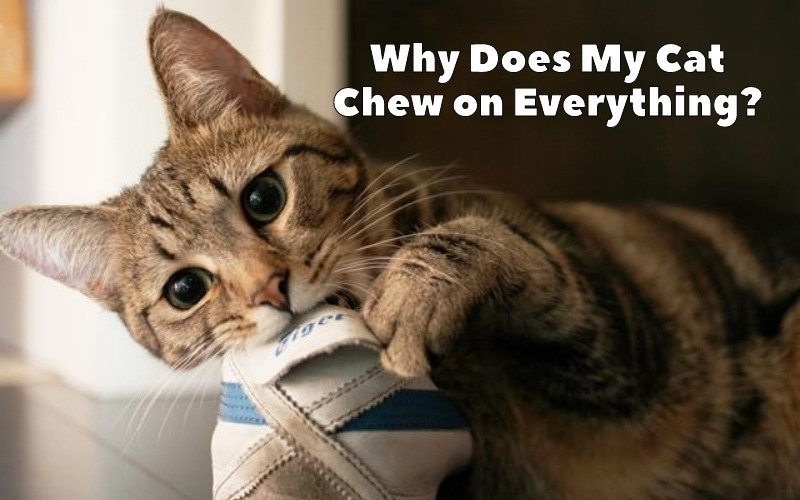Cats fake chew to exercise their jaws and clean their teeth. It’s a natural behavior for cats that shouldn’t be a cause for concern.
Cats are natural predators, and their sharp teeth are essential to their survival. Being that they are domesticated, they don’t need to hunt, and this sometimes leads to poor dental hygiene. Fake chewing allows them to exercise their jaw muscles and clean their teeth.
This behavior can also mean your cat is hungry, bored, or anxious. It’s essential to ensure that your cat has access to clean water, a healthy diet, and adequate stimulation to prevent dental issues or other health problems. If you’re worried about your cat’s fake chewing habits, consult with a vet.

Credit: bengalcatcare.com
Understanding The Behavior
Fake chewing is a common behavior observed in cats that can be confusing for owners to understand. Fake chewing refers to a cat mimicking the act of chewing and swallowing without actually consuming anything. While this behavior might seem strange, it is completely natural and is a result of a cat’s instinctual hunting behavior.
Through fake chewing, a cat is practicing for a potential prey and mimicking the act of biting and tearing apart their food. Cats can exhibit fake chewing behavior when they are playing with toys, grooming themselves or even when they are content and relaxed.
It is important to note that while fake chewing is normal, excessive chewing or the swallowing of non-food items can indicate a larger problem and should be addressed by a veterinarian.
Possible Causes
Cats are known to display a variety of odd behaviors, and “fake chewing” is one of them. One possible cause of this behavior is teething and dental problems. Some cats may also fake chew when they are stressed or anxious.
Attention-seeking behavior can also be a reason why a cat may fake chew. In some cases, cats may fake chew out of boredom or a lack of stimulation. Finally, other medical issues may also cause this behavior. If you notice your cat fake chewing, it’s important to keep an eye on them and schedule a visit with your veterinarian if their behavior persists or if you notice any other concerning symptoms.
Identifying Signs And Symptoms
Fake chewing in cats can be a cause of concern for pet owners. It can be identified by observing their posture and body language such as a tense body or ears flattened backward. Listening for specific vocalizations such as growls or hisses can also be a sign.
In addition, noticing changes in appetite or weight can indicate fake chewing. It’s important to understand the difference between fake chewing and actual chewing, as fake chewing is usually a sign of stress or anxiety. Maintaining a calm environment can help alleviate this behavior.
By being vigilant and understanding these signs and symptoms, cat owners can ensure the well-being of their feline companions.
Addressing The Behavior
If you’ve noticed your cat fake chewing, it could be due to dental problems. Regular check-ups with your veterinarian can rule out any underlying medical issues. Alongside proper dental care, offering chew toys can also help with this behavior. Cats may engage in fake chewing because of anxiety or stress, so identifying and addressing sources of these issues is important.
Interactive playtime and mental stimulation can provide a healthy outlet for these felines. Avoid using medication to address anxiety, as it is not always effective and can have side effects. Overall, understanding the reasons behind your cat’s behavior and providing appropriate care and attention will help to keep your furry friend healthy and happy.
Preventing The Behavior
Fake chewing in cats is a common behavior that is often seen in kittens. One way to prevent this behavior is by starting early with positive reinforcement training. Creating a stimulating environment with lots of toys and playtime can also help.
Another important factor is focusing on dental health and hygiene. Regular brushing and dental check-ups can help prevent dental issues that may lead to fake chewing. Lastly, it’s essential to understand that some cats may require professional help. In some cases, the behavior may be a symptom of an underlying health issue.
It’s crucial to monitor your cat’s behavior and seek professional help if necessary. By following these guidelines, you can help prevent the behavior of fake chewing in your feline friend.
Frequently Asked Questions On Why Is My Cat Fake Chewing
Why Do Cats Fake Chew?
Cats fake chew because it helps them to keep their teeth clean and healthy by exercising their jaw muscles.
Is Fake Chewing Common In Cats?
Yes, it is common. Fake chewing is a common behavior in cats, and it is nothing to be worried about.
Can Fake Chewing Indicate A Dental Problem?
Fake chewing is usually nothing to worry about, but if it is excessive or accompanies other symptoms, it may indicate dental or oral problems, and you should seek veterinary advice.
Conclusion
Now that you have a better understanding of why cats fake chew, you may be more attuned to your furry friend’s behavior. While it can often seem strange, this behavior is actually quite common among cats, and is often indicative of a healthy relationship between a cat and his or her owner.
Whether your cat is fake chewing to show affection or simply to signal that he or she is feeling content, it is important to recognize this behavior as a positive sign of your cat’s emotional well-being. So, the next time your cat starts fake chewing, take a moment to appreciate the bond you share, and remember that it is just one of the many ways that your feline friend expresses his or her love for you.
Remember to stay attuned to your cat’s needs, and you will continue to enjoy a healthy, happy, and rewarding relationship with your furry companion.


